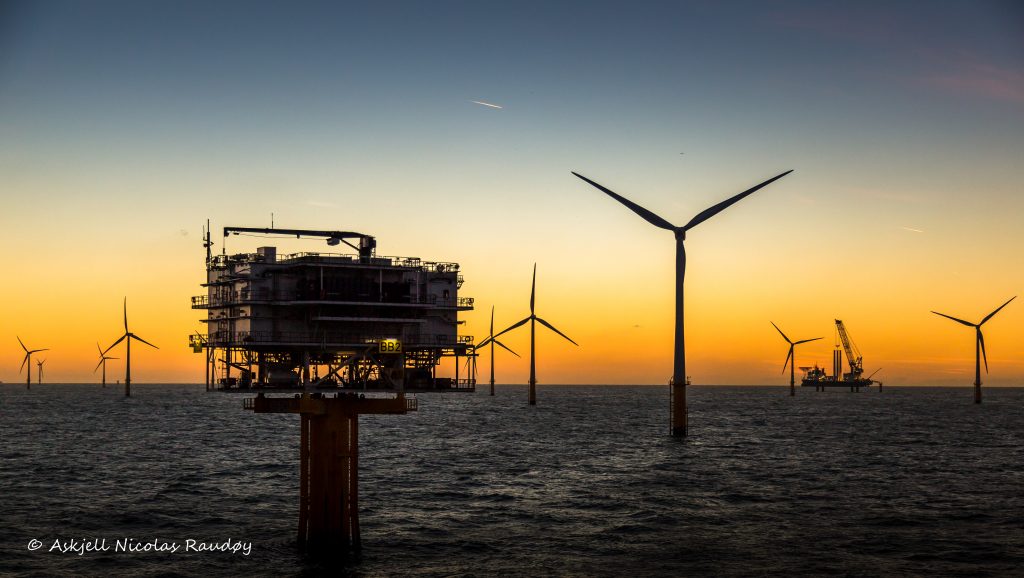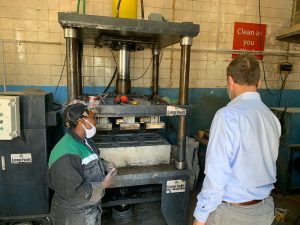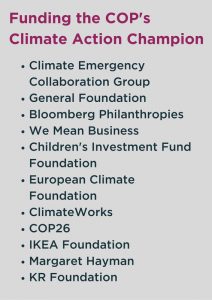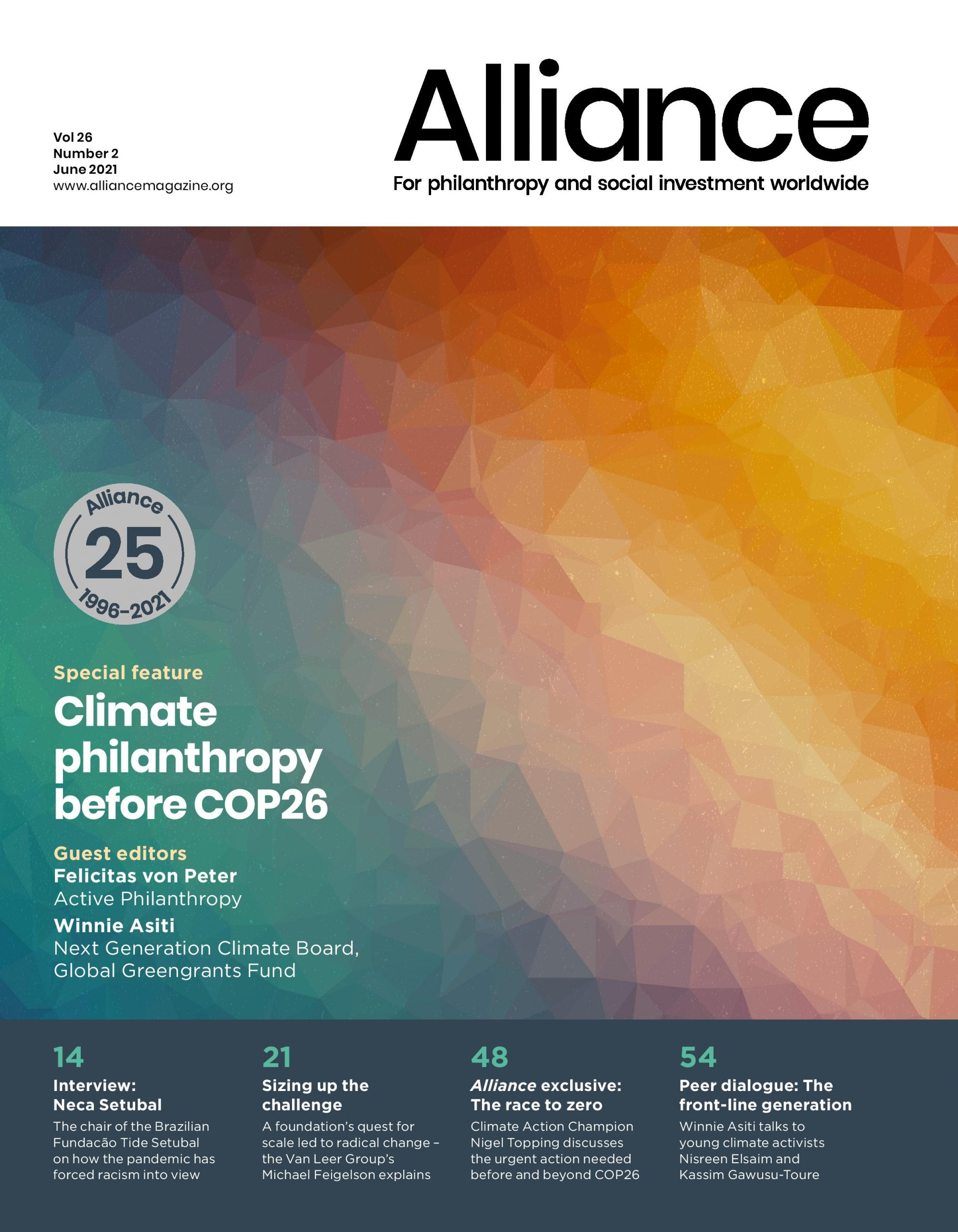
Nigel Topping
Nigel Topping has the world’s climate in his hands. As the UK’s High-Level Climate Action Champion he is responsible for driving the actions of non-state actors – basically anyone and anything not controlled by government – to a fossil free future as the world heads towards the pivotal climate summit taking place in Glasgow in November.
With a background in industry and support from some of the world’s leading philanthropies, Topping discusses prospects for progress at the COP26 meeting with Alliance guest editors Felicitas von Peter and Winnie Asiti and where he sees the need for urgent action.
FvP: You’re the Climate Action Champion for the Conference of Parties? What does that involve?
NT: There’s been a realisation that a new form of multilateralism is needed. You can’t solve global problems with countries alone because so much power is in the hands of investors, businesses, cities and so on. I spent the first part of my career in industry and then I’d been working on the nexus of business and climate change. A year before Paris, I was asked to lead the We Mean Business coalition to ramp up the positive voice of business on climate change. Soon after the UK took over the presidency, I was asked by the UK government if I would take on this role which recognises the crucial role of ‘non-state actors’.

Topping meets members of the Mathare Social and Ecological Justice Network in Nairobi, Kenya.
FvP: What’s been the biggest surprise in preparing COP26?
NT: Despite Covid-19 being an obvious distraction – distraction is a serious understatement – we’ve seen a massive increase in the commitment to get to zero greenhouse gas emissions. In March, we had a huge breakthrough of going from nine trillion to 32 trillion dollars of assets under management being committed to getting to net zero. That’s over a third of the world’s net assets. We’re seeing that in every sector and it’s going faster and faster. That’s been the biggest surprise.
FvP: Do you see the same take-up with the race to resilience?
NT: My personal blind spot coming to this role was the Global South and resilience. We announced in March the first 21 initiatives which we’re including in the race to resilience. There’s a lot of great work happening on resilience so we’re not trying to start anything new, we’re trying to create a much bigger platform. The real challenge is how to bridge the big scaling vectors of governments, businesses and major capital and the local human level.
FvP: Foundations fund your role. What do they get in return?
NT: We’ve got a range of foundations supporting us, some of the ones that you’d expect: IKEA Foundation, ClimateWorks, European Climate Foundation, CIFF. We’ve also had some support from the UK government’s COP26 budget and pro bono secondments from the private sector. That mixed model is the one we need because one of our objectives is that future champions have this support infrastructure to enable us to maintain the momentum when I step down at the end of 2022. (See list of funders below)
FvP: What do you think are the effective levers for funders to use ahead of COP and subsequently?
NT: My advice to new funders looking at this space would be to pile into something that others who have been doing it for years are already doing. One of the problems we have is the search for silver bullets, which tends to lead to fragmented and short-term funding. My advice would be to support one of the platforms – the Climate Emergency Collaboration Group, We Mean Business, ClimateWorks and so on. Do that and learn for two or three years before trying to branch out.
Philanthropy’s incredibly influential because a lot of the most informed voices on climate change are in philanthropy. People like Laurence Tubiana at the European Climate Foundation and Kate Hampton at the Children’s Investment Fund Foundation
FvP: What do you see as the main problem for funders to get involved in climate?
NT: One challenge is that a lot of the levers are now in the private sector and quite a lot of philanthropy is allergic to investing in anything associated with the private sector. But the logic that we need to invest philanthropy in changing policy but not in business or investors doesn’t stand up to scrutiny. I would really encourage them to look at initiatives which are working to transform business, or investors like Share Action, or the Climate Group or Climate Disclosure Project; they’re doing amazing work but are not as well-resourced as some of the conservation types.
FvP: Foundations collectively hold many billions of dollars in endowments. Do you see a need for greater disclosure on where that money’s invested?
NT: Absolutely. I think every foundation concerned about climate change should be completely transparent about its portfolio, for two reasons. One is authenticity, the other is learning. It’s hard to pivot a whole sector if you’ve got an endowment being managed for returns only. Seriously engaging in how the endowment affects the system which you’re trying to change is a huge opportunity for funders to really learn what it takes to change and to get others to change.
FvP: Is greater disclosure necessary but not sufficient? Do you also think that foundations should divest from fossil fuels?
NT: Disclosure is an absolute must. The question of divestment is more complicated. Generally speaking, asset owners have been very late to react to the potential effects on their portfolios of climate change, and that’s because they rely on asset managers who tend to operate on mean reversion that everything will go back to the way it was, so they’re not very good at managing disruptive change. People who thought that they could hold onto oil because it was still going to give them good dividends have lost a lot of money. So just on pure economic grounds, there’s a reason for doing it. Then there’s aligning your portfolio with what you believe in, and there’s a very strong case for divestment of egregious, non-engaged firms, not just in the hydrocarbon sector but also steel, cement, automotive, other sectors that are huge drivers of emissions. There is a grey area though. If you look at the kind of attributes companies will need to build offshore wind farms, for example – offshore experience, risk management appetite, complicated project engineering – those are the kind of skills that oil companies have so I think there is a case to be made for engagement in order to try and get those companies to be part of the transition.

There is potential to transfer skills from oil to renewables. Credit: Askjell Nicolas Raudøy
WA: Do you think the COP presidency is doing enough to ensure that the voices of young people and those that are more affected around the world are at the heart of the conversation?
NT: Just to clarify, I don’t work for the UK government though I work very closely with the team there. I have absolutely no doubt about (COP president) Alok Sharma’s personal commitment to issues like diversity, youth engagement and making sure the voice of the most vulnerable is more prevalent. At the end of March, he held a climate and development summit which was specifically about trying to elevate the voice of countries who see themselves as climate-vulnerable. He’s also instigating a civil society council and a youth council.
In terms of what my Chilean counterpart Gonzalo Muñoz and I are doing, one thing we talked about earlier is the race to resilience. It’s a global campaign particularly focused on those communities for whom resilience is the biggest challenge. We’ve made sure that we’ve got advisers from the Global South who are much more familiar with that agenda than we are, people like Sheela Patel who runs Slum Dwellers International and Saleemul Huq from Bangladesh who’s one of the leading resilience thinkers. We also launched a youth fellowship programme. We’ve got five youth fellows in our team, four of them from the Global South and I’ve been consciously engaging with things like the youth COP.
Driving the sectoral transformation is the next phase of the work and it needs some glue, so we’re particularly looking to establish a small team in Africa and a couple of other teams in Asia and Latin America
WA: The UK is trying to position itself as a climate champion, yet it continues to support fossil fuels within its borders even though it has now made a commitment not to support them overseas. Does this make your work difficult?
NT: This is a very complicated transition for any politician. The UK’s got a legal commitment to net zero by 2050 and the work of policymaking is ongoing now. You mentioned the ending of export credit finance on fossil fuels. I think that that will probably lead to a similar commitment by all developed countries. Regarding the local decision in Cumbria to allow the opening of a metallurgical coal mine, the government has decided to hold an enquiry. I don’t think that mine will ever happen. But I also understand that if you’re a politician in Cumbria, and someone comes up with a project that will create 500 jobs, it’s very appealing in a time when there’s increased unemployment because of Covid.
The UK recently also issued its new guidance on oil and gas industries in the North Sea and some of it’s been frankly mis-reported. It doesn’t say that the UK’s going to issue more licences for exploration for North Sea oil and gas. Rather, it says there will be a review before any other licences are issued to make sure that anything done is in line with the commitment to net zero. I read that as there’ll never be any more licences, but there’s politics at work because there are 40,000 jobs involved.
WA: There’s been a push by some oil companies to put funding into some of the COP26-related activities. What is your take on this?
NT: Any organisation must make robust credible commitments to net zero as a UK government requirement for any partners for the COP. I think they’ve got seven major partners, and none of those are oil companies. Many people want to have a seat at the COP or to influence, but you’re either in the race to zero or you’re not at the table.
FvP: On that question of influence, how influential is philanthropy?
NT: Philanthropy’s incredibly influential because a lot of the most informed voices on climate change are in philanthropy. People like Laurence Tubiana at the European Climate Foundation and Kate Hampton at the Children’s Investment Fund Foundation are people who I think both the president and other ministers in the UK government call on for advice. They have been able to support me to go much faster and they’re able to support all sorts of policy thinking and engagement in different countries and sectors. And I think they share some of the highest levels of ambition. Like me they’re all on fire for getting this done as quickly as possible.
We have to get the one hundred billion committed, but that needs to turn into four trillion in the Global South, and that’s going to be about leveraging private finance.
FvP: How can philanthropy maintain its level of energy post-COP26, especially the shift towards resilience in the Global South? Where do you see funders playing a role post-COP26?
NT: I’m going to make a shameless pitch for what I’m trying to do here. My role lasts beyond COP for another year working with an African champion who is appointed by an African presidency. Driving the sectoral transformation is the next phase of the work and it needs some glue, so we’re particularly looking to establish a small team in Africa and a couple of other teams in Asia and Latin America. Our aim is to establish those teams on a five-year securely funded footing by the end of this year. And as I said earlier, long-term support for platforms that have global footprints, requiring a tilt towards the Global South would be really important. One of the things we’ve found in trying to build up our partnership base in Africa, for example, is that there is not the same sophistication of NGO community working with non-state actors. There’s a lot of grassroots work, but there’s not so much work with businesses, investors or on policy. That all needs to be strengthened.

Nigel Topping visits a plastics recycling factory in Nairobi with the founder Nzambi Mattee, global winner of UNEP Young Champions of the Earth 2020. Credit: Fiona Napier
FvP: If you had one billion to spend on climate over the next ten years, what percentage would you spend on the Global South and what on mitigation in the north?
NT: I think it would be about 75-25 Global South but that would require some long-term systemic change thinking from philanthropists, rather than trying to find ‘the’ project. It makes it very difficult for NGOs to grow if they’re spending 90 per cent of their time worrying about where’s the funding just to maintain, and having to repackage existing programmes to make them look new so that other philanthropists will come in. You’re not changing the system, you’re playing the game.
WA: You’re trying to create these partnerships. What are the specific strategies that you’re going to put in place, not just as climate champion but in your subsequent work and how can philanthropy support this work?
NT: Gonzalo and I are trying to create a campaign structure for the next decade. We have the race to zero and the race to resilience, and we announced in March the first wave of 21 initiatives. We’re also working on the need to mobilise a lot more money. We have to get the one hundred billion committed, but that needs to turn into four trillion in the Global South, and that’s going to be about leveraging private finance. I hope that structure also helps philanthropy, so that if we’ve got 40 initiatives in the race to resilience, those are ones which have the most ambition, the highest potential impact and the right sort of diversity, and those are the ones that philanthropy would support.
 WA: If we have this conversation again in 2030, what do you hope we will be talking about?NT: I hope that we’re celebrating the fact that many emerging countries have leapfrogged technologically, in the way that in Kenya you’ve leapfrogged conventional banking to go straight to M-Pesa and now things like M-Kopa. I think the same kind of leapfrog in energy and transport is possible. I also hope we’ve seen the world come together to unleash a wave of private investment to support that. I hope that we’ve changed the narrative on resilience from one which feels like it’s about helpless victims asking for money to one which is based on proud, dignified, incredibly resilient communities who are part of an act of global solidarity. My hope is that we can look back on this as the decade in which we came to terms with the climate emergency and that we can actually start to feel confident that we’ll tackle the problem overall.
WA: If we have this conversation again in 2030, what do you hope we will be talking about?NT: I hope that we’re celebrating the fact that many emerging countries have leapfrogged technologically, in the way that in Kenya you’ve leapfrogged conventional banking to go straight to M-Pesa and now things like M-Kopa. I think the same kind of leapfrog in energy and transport is possible. I also hope we’ve seen the world come together to unleash a wave of private investment to support that. I hope that we’ve changed the narrative on resilience from one which feels like it’s about helpless victims asking for money to one which is based on proud, dignified, incredibly resilient communities who are part of an act of global solidarity. My hope is that we can look back on this as the decade in which we came to terms with the climate emergency and that we can actually start to feel confident that we’ll tackle the problem overall.




Comments (1)
There are glaring indications that after COP-26 at Glasgow, the approach towards attaining net zero is going to be more Grassroots oriented and that global south will be highly impacted, considering the marked drift from State actors to incorporating non-state actors like youth-led Grassroots organisations and other CSOs. Being of the former category, the organisation which I co founded and serve as CEO, (Centre for Grassroots Sustainability and Sovereignty ) and the latter in which I serve as a consultant (Nature Concerns Inc) I hope to contribute my utmost in making the post COP 26 commitments take effective roots in Cameroon in particular and the global south in general.